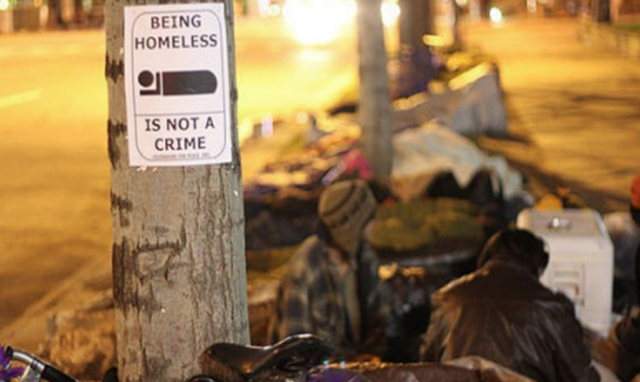
City ordinances continue to criminalize homelessness, according to new report
Colorado policymakers are continuing to criminalize homelessness at record rates, according to a new report by the University of Denver’s Sturm College of Law Homeless Advocacy Policy Project (HAPP).
The report comes out just a few weeks after the Colorado legislature failed to pass, for the fourth time, the Colorado Right to Rest Act, which would have banned the enforcement of laws that prohibit people experiencing homelessness to sit, camp, eat and have their property in public spaces.
According to the new report, the number of “anti-homelessness ordinances” have increased between Colorado Springs, Denver and Boulder over the last few years. In Denver, there’s been an increased use of “move on” orders, which leaves people experiencing homelessness with nowhere to go as the city has a lack of affordable housing and shelter beds.
Both Boulder and Colorado Springs have increased enforcement of camping bans. In 2017, Boulder issued 376 citations for violating the camping ban. Of those, 81.9 percent were issued to people experiencing homelessness. Over the span of three years, Colorado Springs has increased enforcement of its two camping bans by 576 percent, the report states.
Spending on enforcement has also increased, as Boulder spends $1.8 million on enforcement each year, the report states, and spends $3,000-4,000 a day on jailing homeless individuals for municipal court violations. In 2016, HAPP reported the City spent almost $1 million over five years on enforcement of its policies that target the homeless population, principally camping and smoking bans.
In the last year, Boulder has revamped its homeless services, shifting away from short-term housing and toward long-term solutions. The Sturm report suggests, however, these new resources aren’t working for the majority of the homeless population, as there still aren’t enough shelter beds to support the needs of nearly 1,000 people who have sought help — only 25 percent of what’s needed. It recommends repealing the camping ban in favor of a sanctioned camping area, along with increased access to public restrooms and other proven solutions, concluding, “Boulder has the resources, but does it have the commitment to end the cycle of poverty and the criminalization of its homeless neighbors?”
Zinke headlines oil and gas conference

U.S. Secretary of the Interior Ryan Zinke, who recommended shrinking several national monuments to President Trump after a country-wide tour last year, served as the keynote speaker at the Williston Basin Petroleum Conference this week, an annual gathering of influential oil and gas industry members.
It’s the latest show of support Zinke has provided the oil and gas industry. The group Western Values Project found that in a 10-month period last year, Zinke met with industry executives, groups and lobbyists at least 33 times — when he was ostensibly reviewing national monuments for their natural value.
Western Values Project also found that Zinke received $85,800 in campaign contributions for oil and gas industry members, including his top donor, Taylor Reid, the president of Oasis Petroleum.
“Secretary Zinke has done the bidding of extractive industries over our public lands and national parks since day one,” said Deputy Director of Western Values Project Jayson O’Neill in a press release. “We’d all be better off if Secretary Zinke spent as much time defending public lands as he does glad-handing with the special interest who have filled his campaign coffers and profit off of our public lands.”
Zinke’s speech at the conference comes as many in the North Dakota region feel like the Bakken fields are primed for even more growth with a recent increase in oil prices.
Boulder County communities thinking outside the box on oil and gas threat

Several Boulder County communities are getting creative in their efforts to thwart the oil and gas operations likely headed their way in the coming months.
Longmont City Council has authorized a $3 million payment to two oil companies in exchange for giving up a dozen potential drill sites within City limits. The move will still allow horizontally drilled wells and fracking to potentially proceed beneath City-owned property such as Union Reservoir. Supporters of the compromise point out that it will at least prevent dangerous levels of volatile organic compounds such as benzene from being released within neighborhoods. But the move is not without controversy, as many anti-fracking activists believe the compromise is wholly unacceptable and will still allow the oil and gas industry to endanger public health.
In addition, the Cities of Boulder, Lafayette and Longmont are also considering imposing local severance taxes on industry operations as a way of discouraging development within the communities. The severance tax idea is still in its early stages and the various city councils have yet to determine the exact means of imposing them. They could be based on many different aspects of oil and gas operations from truck traffic to air quality impacts. It is most likely the towns will place the proposed taxes on this November’s ballot, which will likely also include the statewide 2,500-foot setback initiative.














